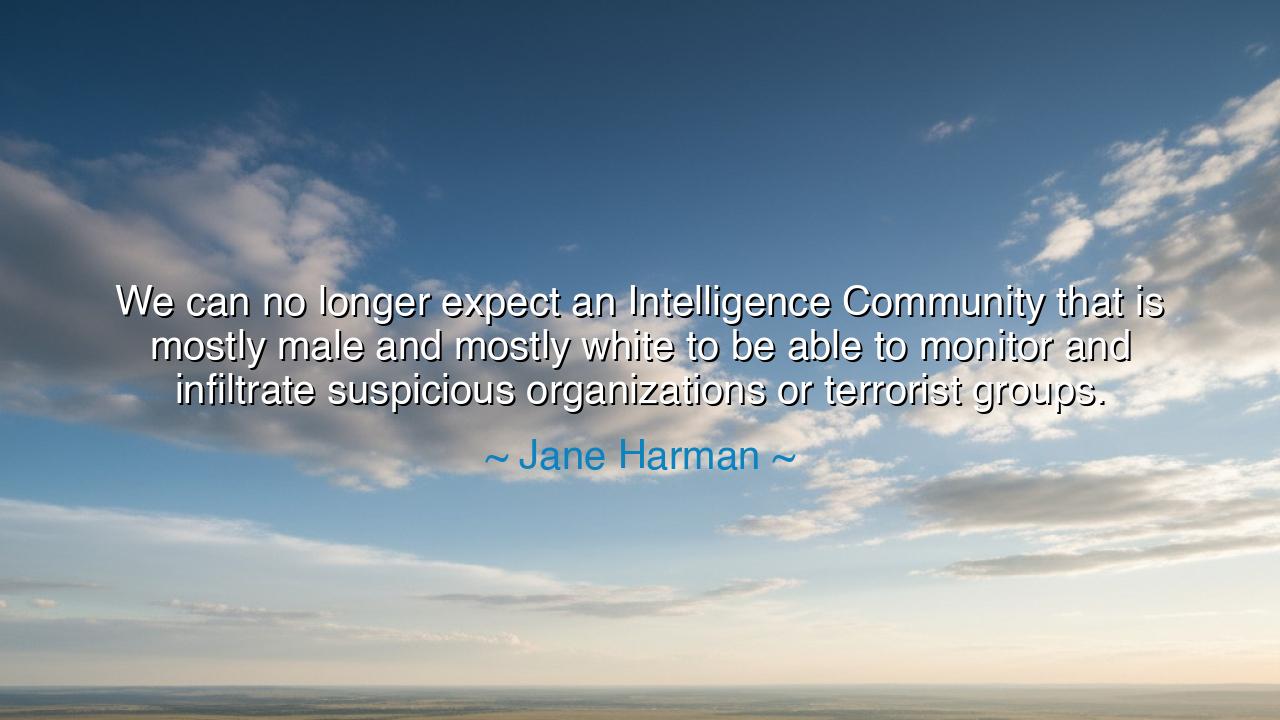
We can no longer expect an Intelligence Community that is mostly
We can no longer expect an Intelligence Community that is mostly male and mostly white to be able to monitor and infiltrate suspicious organizations or terrorist groups.






Here is a powerful, ancient-style reflection on Jane Harman’s quote:
The Call for Many Voices
In the chronicles of nations, there comes a time when wisdom demands renewal — when the old vessels, once sturdy and proud, can no longer contain the spirit of a changing world. When Jane Harman declared, “We can no longer expect an Intelligence Community that is mostly male and mostly white to be able to monitor and infiltrate suspicious organizations or terrorist groups,” she was not merely speaking of policy, but of vision — a call for transformation born of necessity and truth. Her words echo through the corridors of power like a bell summoning the dawn: it is time to awaken to diversity, to understanding, to the boundless strength that lies in the many, not the few.
For how can one guard the world if one cannot see the world as it truly is? The mind that would protect a people must reflect the faces, voices, and hearts of those it serves. When all eyes look from the same vantage point, entire horizons remain unseen. The ancient kings knew this: even the greatest ruler would surround himself with advisers from distant lands — poets, scholars, warriors, and merchants — so that every corner of the realm might be known. In sameness lies blindness; in difference lies sight.
Consider the tale of the Ottoman scholar Ibrahim Muteferrika, a convert from Transylvania who rose to prominence in a foreign empire. Because he had walked in two worlds, he could bridge them; because he spoke the tongues of both East and West, he became a voice of understanding between civilizations. His insight helped shape the empire’s diplomacy and intellectual reform. Had the sultan trusted only those born within his court, he might never have seen beyond his own walls. So too must the modern world learn: no single people, no single gender, no single heritage can perceive the whole of human complexity.
The Intelligence Community, as Harman speaks of it, is not merely a collection of spies and analysts — it is the guardian of peace, the interpreter of shadows. To send forth such a force into a world of countless languages, customs, and beliefs without reflecting that same variety is to fight blindfolded. The enemy hides in understanding, and the watcher who does not know the scent, the rhythm, or the silence of another culture will miss the signs that foretell danger. Empathy becomes a weapon; diversity, a shield.
Yet, this truth is not confined to governments alone. In every sphere — be it business, art, education, or faith — the lesson endures: the strength of a group is found not in its uniformity, but in its harmony. Like a choir, each voice brings a different note, and only together do they make the music whole. The wise leader does not seek reflection in others, but refraction — light bent through many lenses, creating the full spectrum of truth.
The heart of Harman’s message is both moral and practical. When institutions remain narrow in composition, they fail not only ethically but effectively. The path forward, then, demands courage — to invite difference, to listen deeply, to train those unlike ourselves, and to trust them. It is not an act of charity, but of strategy; not of concession, but of enlightenment. The future belongs to those who can understand the world from more than one point of view.
So let this be the teaching passed to all who would lead or serve: surround yourself with the unfamiliar. Seek counsel from those whose stories differ from your own. Walk among people who challenge your assumptions, for only then will your vision sharpen. And when you build — whether an army, a company, or a community — build it not in your own image, but in the image of the world. For the world, in all its colors and contradictions, is the truest teacher of all.
Thus spoke the wise: diversity is not weakness but wisdom. The day we learn to see through every pair of eyes is the day we will finally understand what it means to see at all.






AAdministratorAdministrator
Welcome, honored guests. Please leave a comment, we will respond soon